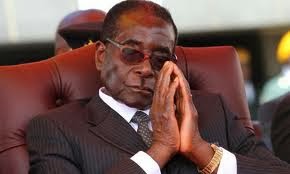The news of Nelson Mandela’s death reverberated across the globe, eliciting numerous heartfelt tributes from admiring citizens, politicians, and more. It seems that nearly everyone, whether they agreed with Mandela’s policies or not, recognized the enormous impact he had on South Africa and the world.
The Soweto Gospel Choir’s Woolworths Flashmob One of the more recent and surprising tributes came in a Pretoria Woolworths department store. The Soweto Gospel Choir surprised shoppers with a moving rendition of Johnny Clegg’s “Asimbonanga.” (Translation: We have not see him.) Originally, the choir was going to sing James Brown’s “I Feel Good” as a marketing pitch for the store, but changed its tune after Mandela died.
Bill Keller’s New York Times obituary Bill Keller wrote an extensive obituary that provided a comprehensive look at Mandela’s life and influence. Keller was well equipped for the piece, having served as the newspaper’s former Johannesburg bureau chief in the 1990s and interviewed Mandela in 2007. The obituary includes unpublished comments from the interview, including reproaches of his successors, as well as this powerful line, “Hating clouds the mind. It gets in the way of strategy. Leaders cannot afford to hate.”
Maya Angelou’s “His Day is Done” At the request of the U.S. State Department, Maya Angelou penned “His Day is Done” as a tribute poem on behalf of the American people to Mandela. Circulated in 15 languages, the poem praises Mandela’s endurance and commitment to freedom, and compares him to David slaying the mighty Goliath.
Jacob Zuma leading “Thina Sizwe” It’s well known that Jacob Zuma received more boos than cheers when he took the stage in Johannesburg at Mandela’s memorial service, but he struck a different tone at the funeral in Mandela’s home town in Qunu. After stepping up to the microphone, he began to sing “Thina Sizwe,” a song from the apartheid era representing the struggle and determination for freedom. Hundreds joined in, and many even continued after it ended with “Nelson Mandela,” another moving struggle-era song.
Tony Leon’s Tribute, 15 Years Ago Tony Leon, a member of the opposition party to the ANC, refused to join Mandela’s cabinet when asked. But when Mandela’s presidency was drawing to a close, Leon stood in front of parliament to praise the country’s first black president. He said, “People might think it is difficult for a politician to give tribute to a man of an opposing party. In fact this is the easiest speech I have ever delivered to this house…My respect and admiration for him is unconditional. He graces this house. He graces this country. He graces humanity.”
The Eiffel Tower Following Mandela’s death, the Eiffel Tower in Paris was lit up for six nights in commemoration thanks to the Institut Français and the National Arts Council of South Africa, along with the City of Paris and Société d’Exploitation de la Tour Eiffel. The inscription, “Nelson Mandela 1918-2013″ was lit in enormous letters, and sky projectors flashed the colors of the South African flag. The tribute was especially touching on Dec. 16, South Africa’s Day of Reconciliation.
Botlhale Boikanyo’s poem on “South Africa’s Got Talent”
The year before Mandela died, 11-year-old Botlahle Boikanyo performed on “South Africa’s Got Talent” with a moving poem that paid tribute to Nelson Mandela, or Tata. Naturally, she won, and it’s definitely worth a listen. When she pulled a South African flag from the pocket of her orange prison jumpsuit at the end, there may not have been a dry eye in the house.
The Johannesburg Shul and the story of Joseph Nelson Mandela was dubbed by many as the “Joseph of South Africa” for his commitment to reconciliation and rejection of violence after the end of apartheid. Remarkably, the story of Joseph was the Torah portion the weekend after Mandela’s death. Rabbi Warren Goldstein recounted to a crowd of thousands in Johannesburg Joseph’s — and Mandela’s — story of overcoming years of imprisonment to lead his nation.
Joyce Banda’s eulogy At the final memorial service in Qunu, Joyce Banda, the first female and current president of Malawi, delivered a eulogy that brought hundreds to their feet. From the beginning, she strayed from her prepared speech and said this instead, “After three years of isolation, humiliation and name calling, I found myself in a situation where I had to work with those who had desired to prevent me from becoming president of my country. I had to forgive, but I had to forgive them without any effort, because my Madiba had prepared me.”
Desmond Tutu’s call for unification Archbishop Desmond Tutu has long been considered one of Mandela’s closest friends and confidants, and indeed their combined commitment to a free and equal South Africa has had enormous influence on the country today. So Tutu’s words following Mandela’s death were especially poignant. “The sun will rise tomorrow. It will not be as bright as yesterday. But life will carry on…God is asking South Africans, please become what you are, show the world we are members of one family. We belong together.”




















